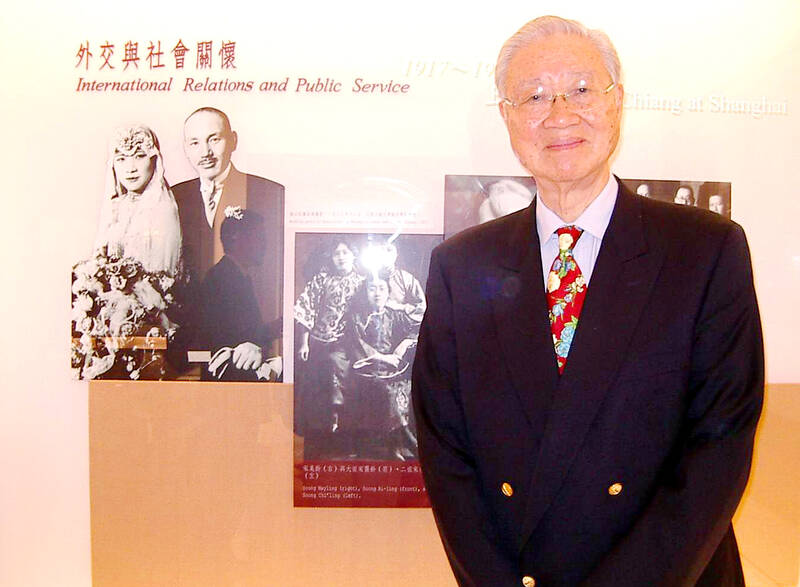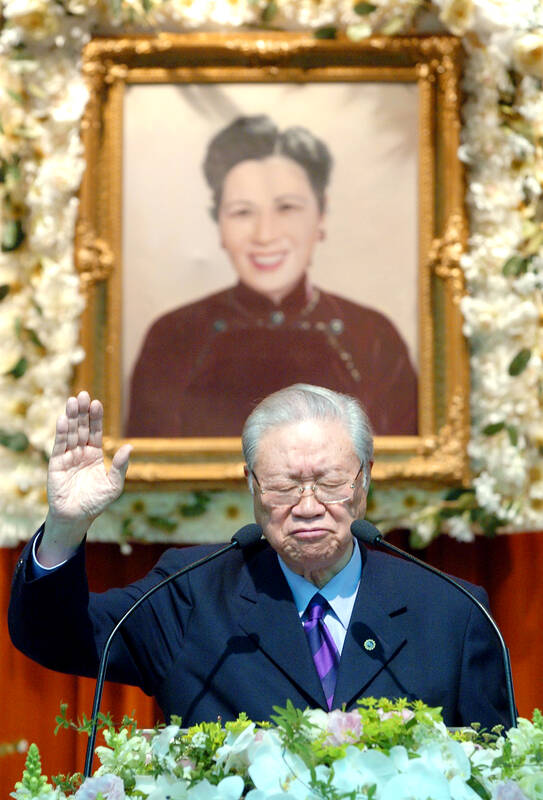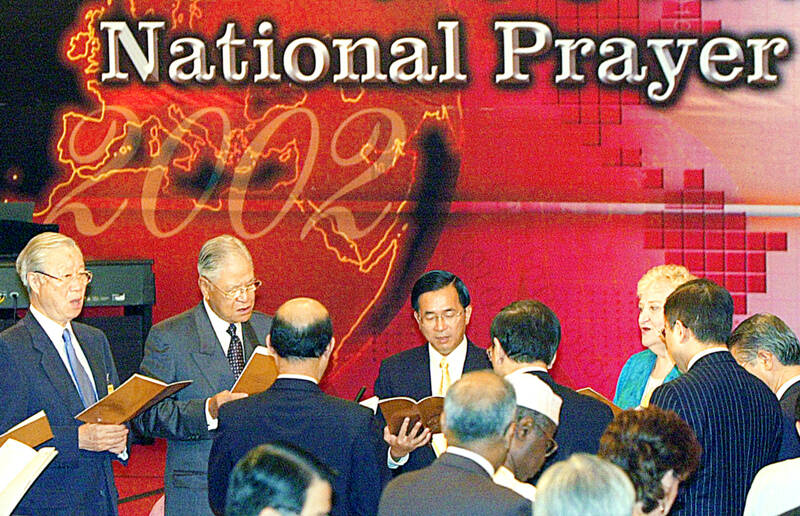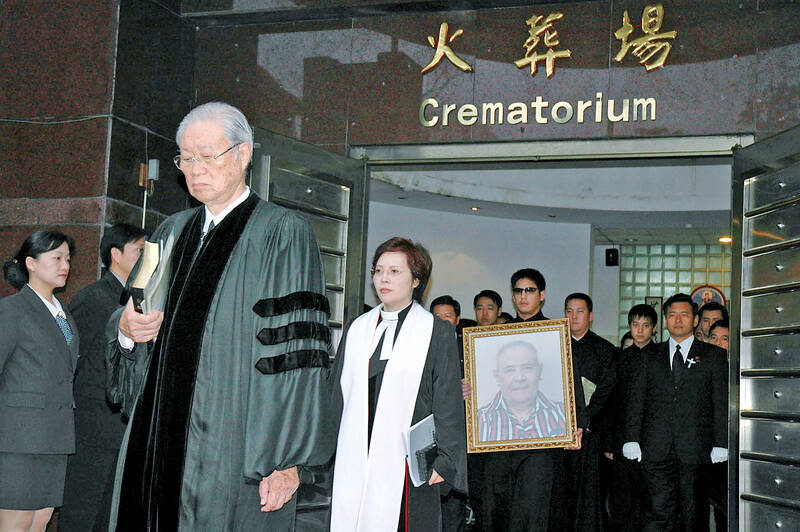Chow Lien-hwa (周聯華) was recovering from gallstone surgery in Boston when the call came, urgently summoning him back to Taiwan. It was April 5, 1975, and former president Chiang Kai-shek (蔣介石) had just died. The Baptist pastor was put on the first flight back to help plan the funeral.
Having conducted weekly Sunday services at the Chiang family’s private church Kaigetang (凱歌堂) since 1951, Chow was the only man they trusted to do the job. He later also led memorial services for Chiang’s son Chiang Ching-kuo (蔣經國), his wife Faina Chiang Fang-liang (蔣方良) and their son Chiang Hsiao-wen (蔣孝文). He was often called the “palace pastor” (宮廷牧師).
But preaching to the Chiangs made up just 50 minutes in Chow’s busy weekly schedule, where he also led the Grace Baptist Church (懷恩堂), served as president of Tunghai University (東海大學), worked with inmates at Green Island and conducted other duties for the Baptist Church in Taiwan.

Photo: Chou Fu-mei, Taipei Times
More surprising given his association with the Chiangs is Chow’s decision in 1990 to organize and co-host a memorial ceremony for the victims of the 228 Incident, an anti-government uprising in 1947 that was violently suppressed. Under the authoritarian rule of the Chiang family, the topic was strictly taboo, and even though martial law had been lifted three years earlier, it was still a risky venture.
Chow stresses in his autobiography that he although he often preached to politicians, he wasn’t a “political pastor.” It was simply time for Taiwan start addressing this tragic past, and he was merely fulfilling his duty to his faith and those in need.
CONVERTING TO CHRIST

Photo: Lo Pei-der, Taipei Times
Chow was born in 1920 to a wealthy family in Shanghai. They were devout Taoists, and Chow was active in family rituals and ceremonies into his teens. After high school, he he attended the Baptist-established University of Shanghai, where he majored in business administration.
The school had mandatory weekly worship sessions, and Chow felt put off by them at first — especially since Baptists do not worship physical representations of Jesus.
“What bothered me most was that the prayer hall was empty — who exactly were they praying to?” he writes.

Photo: Fang Pin-chao, Taipei Times
Nevertheless, Chow joined the “eight beatitudes” youth group on a whim “just for fun,” he recalls. “I was more interested in the games and snacks.”
After three years in the group, however, his stance gradually softened under the influence of advisor Hsu Pao-chien (徐寶謙) and resident missionary Innabelle Graves Coleman, who later started Grace Baptist Church in Taipei.
When Japan occupied Shanghai in 1941, Chow left the city in protest with just one semester remaining until graduation. He found work in Chongqing, more than 1,000km from home, where he found comfort in the worship songs he learned in Shanghai and started attending local Sunday services. He was baptized while attending Chongqing University.

Photo: CNA
Due to his desire to study abroad, Chow returned to Shanghai University after World War II to finish his degree. He reunited with Coleman, but he was still unsure about his faith and wrote that he felt a “strong distaste” toward pastors, even though he had conducted worship sessions as a student leader during the war.
Upon learning of his doubts, Coleman told Chow she had no answers, and that he should just pray. A few minutes later, Chow suddenly knew what he needed to do. He stood up and declared that he would dedicate his life to God.
PREACHING TO THE BIGWIGS
In 1949, Chow headed with his wife to study at Southern Baptist Theological Seminary in the US. His goal after finishing his studies was to return home, but by then his “home” was no more as the Chinese Communist Party had overrun China. Despite having a chance to remain in the US, he wanted to preach to Chinese-speaking people, and since China was no longer an option, he headed for Taiwan. He landed in August 1954 through the help of the church and began teaching immediately at the Taiwan Baptist Theological Seminary.
It was not easy at first in the post-war, conservative environment, but Chow’s responsibilities grew quickly.
Just a month after he moved to Taiwan, the wife of then-secretary general to the president Chang Chun (張群) invited Chow to preach at an afternoon women’s prayer meeting — which was led by Chiang Kai-shek’s wife Soong Mei-ling (宋美齡). Soong was very pleased with his performance, and invited him to preach at Kaigetang the following Sunday.
Chow recalls being so focused on the big task that he barely noticed the president entering, but he remembered Chiang’s “piercing eyes” staring at him, intensely focused on his words during the sermon. Other government bigwigs were also present. It helped that the attendees were concerned about the same things — the fate of the Republic of China and defeating the communists. Chow focused his sermons and prayers on staying strong in perilous times, and it worked well.
One had to be careful as a pastor to the Chiangs, however, and Chow had to constantly watch his words. He made two decisions then — to never discuss or become directly involved in politics, and to never publicly speak about his involvement with the Chiang family. He did not did so until Chiang’s death.
Unless he was ill or had scheduling conflicts, Chiang showed up every Sunday, always listening attentively no matter what calamity he was going through — including the assassination attempt on his son and Taiwan’s exclusion from the UN. However, Chow recalls that Chiang appeared shaken after Japan broke ties with Taiwan in 1972.
RISKY BUSINESS
The highest profile guest at Kaigetang was then-US president Dwight Eisnhower, whose visit to Taiwan in 1960 coincided with a Sunday. A great deal of preparation was made, and at the end of the sermon Chiang personally introduced Chow to Eisenhower.
The downside of his role was that the national security service was always watching him. It was still the height of White Terror, and one could get arrested and killed for the tiniest misstep. One night, a military jeep stopped in front of Chow’s house at 2am and an officer knocked on his door.
“My time has come,” Chow thought, but it turns out that the officer was just delivering a dinner invitation from Chiang, who did not want to be the only male at an event with Soong’s friends.
During Chiang’s funeral, the timing was of utmost importance — every step had to be precise leading up to the mass public mourning, all of it controlled by a stopwatch in Chow’s hand. But things went wrong as Soong arrived 15 minutes early. Instead of waiting, her followers told him to start the sermon immediately, and Chow had to improvise extra content the spot. He first had the children’s choir come up and sing a few songs while he pondered what to do, then he spent the next 10 minutes discussing Chiang’s favorite Bible verses.
Chow was not too fond of Chiang Ching-kuo at first, and wasn’t looking forward to conducting his funeral as he grew ill. But the younger Chiang redeemed himself at the last minute in Chow’s eyes by lifting martial law, ending state control over media and allowing the formation of opposition parties in 1987.
In 1990, Chow accepted an invitation to co-conduct a prayer ceremony for the victims of the 228 Incident, and helped contact politicians to make sure that the organizers wouldn’t get in trouble.
Chow believed that it was necessary to do so for the victim’s families, and also to push forward democracy and freedom of speech. The event took place at Grace Baptist Church with major politicians from all camps attending, and Chow writes that this event was the most meaningful thing that he had ever done.
“When I did this, I had stepped out from being a ‘palace pastor’ to ‘society pastor,’” he writes. “Some may wonder, does this make me a ‘political pastor?’ I would say no, as I didn’t do it for politics; it was a desire to help society inspired by my faith.”
Taiwan in Time, a column about Taiwan’s history that is published every Sunday, spotlights important or interesting events around the nation that either have anniversaries this week or are tied to current events.

Three big changes have transformed the landscape of Taiwan’s local patronage factions: Increasing Democratic Progressive Party (DPP) involvement, rising new factions and the Chinese Nationalist Party’s (KMT) significantly weakened control. GREEN FACTIONS It is said that “south of the Zhuoshui River (濁水溪), there is no blue-green divide,” meaning that from Yunlin County south there is no difference between KMT and DPP politicians. This is not always true, but there is more than a grain of truth to it. Traditionally, DPP factions are viewed as national entities, with their primary function to secure plum positions in the party and government. This is not unusual

More than 75 years after the publication of Nineteen Eighty-Four, the Orwellian phrase “Big Brother is watching you” has become so familiar to most of the Taiwanese public that even those who haven’t read the novel recognize it. That phrase has now been given a new look by amateur translator Tsiu Ing-sing (周盈成), who recently completed the first full Taiwanese translation of George Orwell’s dystopian classic. Tsiu — who completed the nearly 160,000-word project in his spare time over four years — said his goal was to “prove it possible” that foreign literature could be rendered in Taiwanese. The translation is part of

The other day, a friend decided to playfully name our individual roles within the group: planner, emotional support, and so on. I was the fault-finder — or, as she put it, “the grumpy teenager” — who points out problems, but doesn’t suggest alternatives. She was only kidding around, but she struck at an insecurity I have: that I’m unacceptably, intolerably negative. My first instinct is to stress-test ideas for potential flaws. This critical tendency serves me well professionally, and feels true to who I am. If I don’t enjoy a film, for example, I don’t swallow my opinion. But I sometimes worry

US President Donald Trump’s bid to take back control of the Panama Canal has put his counterpart Jose Raul Mulino in a difficult position and revived fears in the Central American country that US military bases will return. After Trump vowed to reclaim the interoceanic waterway from Chinese influence, US Defense Secretary Pete Hegseth signed an agreement with the Mulino administration last week for the US to deploy troops in areas adjacent to the canal. For more than two decades, after handing over control of the strategically vital waterway to Panama in 1999 and dismantling the bases that protected it, Washington has